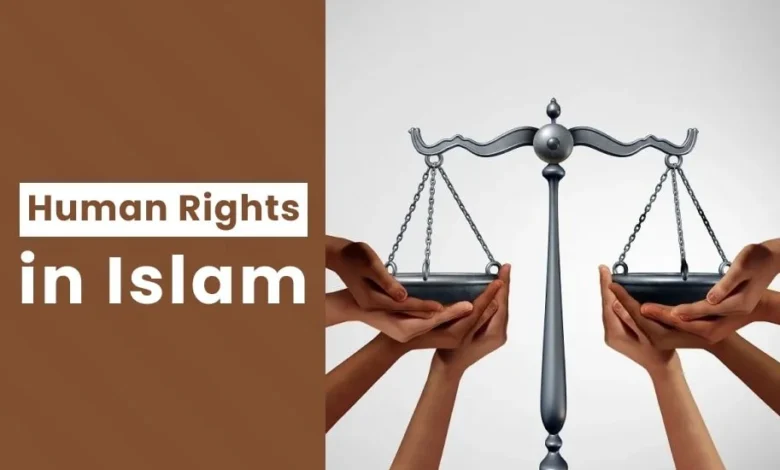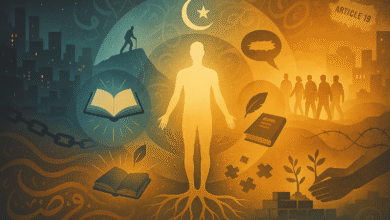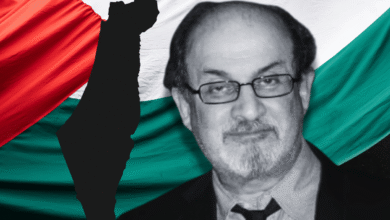Islam and Human Rights

HUMAN RIGHTS have become an important global issue. This has been so for a number of reasons, some gen- uine and some not so genuine. The two world wars awakened mankind to some of the gruesome injustices that are being inflicted upon human beings dur- ing the periods of so-called peace.
The UN Declaration of Human Rights repre- sents an expression of this awareness and a com- mitment to rectify the situation. Although all nations of the world have not yet ratified this declaration, nonetheless it represents an impor- tant milestone of humankind’s march towards an era of political tolerance and respect for human rights.
The Helsinki Agreement represents another milestone and has played a very important role in influencing a number of countries of the world, particularly those under the spell of com- munism, to become more responsive to human rights concerns. A number of international organ- isations have been trying to monitor the human rights situation in different parts of the world and they too have played some role in creating a climate of respect for human rights.
These represent positive developments, tri- umphs along man’s march towards destiny. From an Islamic viewpoint, although there are many flaws at the conceptual level as well as a lot of politiking and hypocrisy in practice, yet, despite these weaknesses, greater awareness of human rights and multi- dimensional efforts to ensure their enforcement deserve to be welcomed. By and large, these efforts represent a forward
movement.
By Senator Khurshid Ahmad
Friday feature
Bosnia and the Balkans and there seems to be no end to this sordid story!
Countries which have otherwise stood for democracy and human rights in Europe and America were also guilty of worst human rights violations in their own colonies and protectorates in Asia, Africa and Latin America. In the post colonial period, it has to be regretfully admitted, the rulers are, by and large, behaving more in the tradition of the colonial rulers and much less as representatives of their own people, protect ing their rights and fulfilling their aspirations. It is unfortunate that the Muslim world is no excep- tion to this. Most of the Muslim countries of the world today are ruled by people who are account able to none and whose record in respect of viola- tion of human rights is disgraceful.
As far as Islam is concerned, its contribution in the realm of man’s search for human rights, has
It is only by widening the concept of human rights and restoring its equation with obligations that these can be achieved in our own age. That is why I believe that Islam can play a very important role in
promoting human rights at the micro-level of civil society as well as at the macro-level of the world community.
It is, however, undeniable that the Western tradition in respect of human rights is not very transparent. The classical periods of Greek and Roman rule cannot boast of objective tradi- tion of respect for human rights. Greek and Romans societies legitimised discrimination between humans and between men and women, to an extent that there was no possibility of truly shared social existence based on the con- cept of unity of man. Social and political power was monopolised at the top of the pyramid while at the base there were slaves, serfs and common- ers who were not accepted as full humans. The same situation prevailed continued in the medieval period and it was only in the 12th and been unique. Islam has been a liberating force 13th centuries that people began to rebel against for the mankind. The Qur’an is a charter of the tyrannical status quo. The struggle for human human rights and the Prophet (peace be upon rights began as a reaction to this situation. It was him) not only guaranteed those rights, but actual a result of this struggle that the kings and rulers rights. His Khutbah on the occasion of the last ly established a regime which respected those were forced to concede certain human rights. This piecemeal liberation represents a process. Hajj is a glorious declaration of human rights.
that has continued till today.
Muslim rulers, Muslim history is characterised by Muslim rulers, Muslim history is characterised by a high degree of respect for human rights. The and the courts safeguarded these rights of all and sundry. This has been so far a number of reasons. First, human rights in the Islamic context have not been a gift from the rulers nor were they secured as a result of concessions won from the rulers by the common people. Instead, these rights have been guaranteed by God and His Prophet (peace be upon him) and as trustees, the rulers were obliged to accept them as a divine command. The people also knew that these rights are theirs as rights guaranteed by God, which no one can legitimately take away. In the
Islamic political system the rulers are accountab to God and to the people and this has acted as self-fulfilling mechanism for the establishment human rights. Not that there were not violation by certain rulers and in certain places, yet thi was an exception and not the rule and that to was looked upon as illegitimate by all. As a resu of this unique constitutional position, huma
rights became enforceable both through the jud cial system as well as through the religio-mor process. That is why, with the establishment an Islamic state and with the success of Islam resurgence, respect for human rights is bound
increase.
The Islamic Movements and their workers a today at the receiving end of state terror. The are the victims of violations of human rights an have suffered enough to know the value of the rights. That is why it is hoped that the future democracy and the rights of the people would t safer in their hands.
Secondly, Islamic concept of human rights wider than the concept which has becom accepted in the West during the last seven ce turies. The civil and political rights of the indivi ual constitute the core of the human rights decl ration in in the West, but individual’s cultural an religious rights do not find any position of prior ty in this scheme. Economic rights were also ori inally neglected, but are now gradually bein acknowledged. At the conceptual level the framework is is flawed because the individual alone. Men and
not
Family, social
whol
and women live in societ social groups, cultural entities, civil soc ety are as important as state and its politic organs. As such, human rights must cover no only individual and political rights, but als groups and social entities as also righ relating to religious and cultural communitie The Western concept of human rights lacks thi dimension.
rights of
Thirdly, “rights” cannot have a healthy exi: tence without its counterpart-“obligations.” I fact the two represent two sides of the same coir Rights of one become the obligations of others Unfortunately, in the Western tradition, marre by distorted emphasis on individualism, th other dimension of civil society i.e. social respon sibility, has been greatly ignored. In the Islami formulation, obligations are embedded in th very concept of rights. Rights become self-fulfil ing only if one’s rights are accepted by others a their obligations, both at the individual as well a at the collective level of the civil society. Th legal system not only accepts this, but is entrust ed to establish this balance between the two. It i Western world and lies at the root of violation o this balance that has been disturbed in th human rights at all levels, i.e. individuals, civi society, state power and international perio
uniqueness of the Islamic concept lies in through respect of that equation that justice car obligations into one balanced equation. It is only really be established amongst human beings and peace achieved for the human society at large.
Despite those historic developments – the Revolution, the American Revolution and the Glorious Revolution of Britain, the French Ulema were the standard bearers of these rights integrating both these dimensions of rights and ascendence of democracy in most of the European lands the 20th century has wit. nessed violation of human rights on a mass scale in most of the European countries, not merely under Fascist regimes sof Hitler, Mussolini and Franco, or under Communist totalitarian regimes of Russia and Eastern Europe, but also under number of democratic regimes. Of course, the gravity, the nature and the forms of human rights violations have differed, yet substance of miscar- riage of these rights is undeniable. The record is not very bright indeed. The latest is genocide in
May I conclude by submitting to the intellectu als, as well as to the political strategists of our time, that it is only by widening the concept of human rights and restoring this equation with obligations that human rights can be achieved in our own age. That is why I believe that Islam car. play a very important role in promoting humar rights at the micro-level of civil society as well as at the macro-level of the world community.





